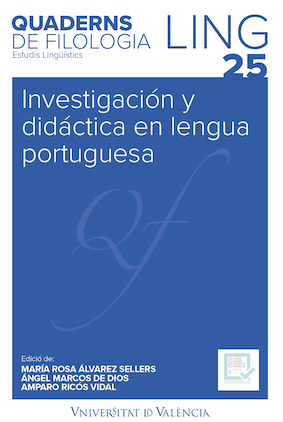La gramàtica escolar i la "gramàtica popular" en l'últim quart del segle XIX: subsidis per a una historiografia de l'ensenyament de la llengua portuguesa
DOI:
https://doi.org/10.7203/qf.0.19066Paraules clau:
gramàtica popular, gramàtica escolar, portugués, llengua materna. Resum
Resum
En les últimes dècades, el "corpus fonamental" de les obres gramaticals ha sigut obligat. No obstant això, no pocs textos són relegats a una "historiografia menor" de la gramàtica portuguesa. A partir d'un "estat de la qüestió" sobre la gramàtica escolar de l'últim quart del segle XVI, aquest article analitza dues "gramàtiques populars" (1871, 1882) com a textos metalingüístics que presenten característiques estructurals, conceptuals, terminològiques i discursives en sintonia amb l'objectiu d'acostar el coneixement accessible i actualitzat al públic en general.
 Descàrregues
Descàrregues
Descàrregues
Publicades
Com citar
-
Resum598
-
PDF (Español)356
Número
Secció
Llicència
 Este obra está bajo una licencia de Creative Commons Reconocimiento-NoComercial-SinObraDerivada 4.0 Internacional.
Este obra está bajo una licencia de Creative Commons Reconocimiento-NoComercial-SinObraDerivada 4.0 Internacional.
Tots els documents inclosos a OJS són d'accés lliure i propietat dels seus autors i/o institucions editores, i per tant, qualsevol acte de reproducció, comercialització, comunicació pública o transformació total o parcial necessita el consentiment exprés i escrit d'aquests.
Authors who publish with this journal agree to the following terms:
- Authors retain copyright and grant the journal right of first publication with the work simultaneously licensed under a Creative Commons Attribution License that allows others to share the work with an acknowledgement of the work's authorship and initial publication in this journal.
- Authors are able to enter into separate, additional contractual arrangements for the non-exclusive distribution of the journal's published version of the work (e.g., post it to an institutional repository or publish it in a book), with an acknowledgement of its initial publication in this journal.
- Authors are permitted and encouraged to post their work online (e.g., in institutional repositories or on their website) prior to and during the submission process, as it can lead to productive exchanges, as well as earlier and greater citation of published work (See The Effect of Open Access).




